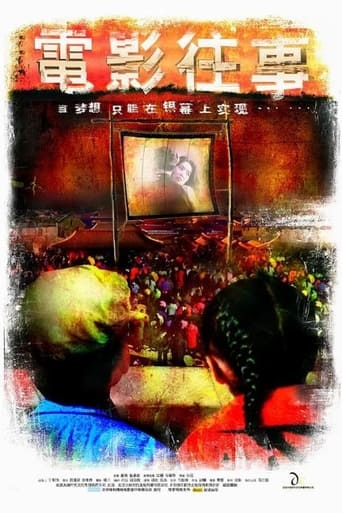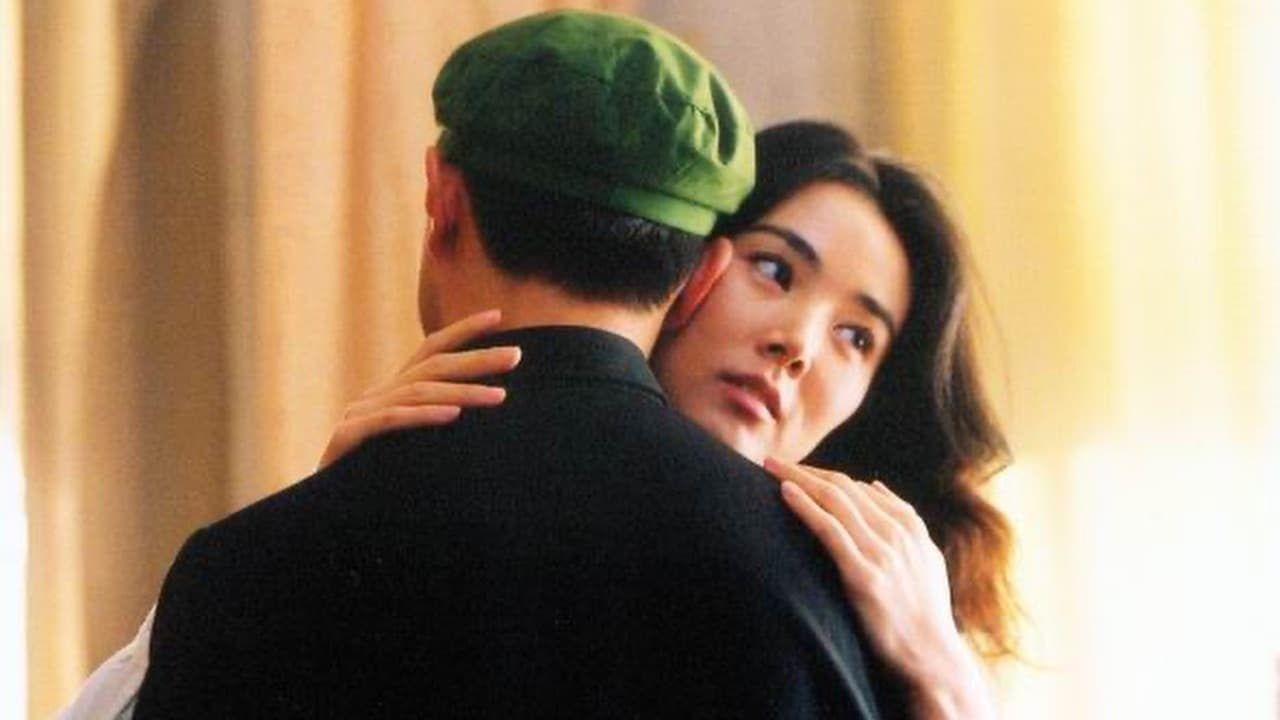sangepengyou
I'm not entirely sure why I passed on this film when it landed in my city. Perhaps it was a busy schedule or perhaps it was the blatant comparison to the Italian "Cinema Paradiso" in the advertising used for this film.With all due respect to the "CP", while the two films share an early common thread of a young child with a passion for movies (with a requisite "single mom" in a small town), these two films should not really be compared side by side. The desire and temptation toward comparison would be deceptive and misleading to most expectations of most potential viewers. Indeed, they are very different stories. Nor should "CP" used as a benchmark for all films which have a child character that enjoys going to the movies. Not that it isn't without merit, but, rather, again, this is a different film with a very different feel. The Italian film was meant to have a big emotional bang; this Chinese film, however, goes the restrained route of slow, emotional realization.We meet our heroine, Ling Ling, as she commits what appears to be an act of senseless violence-- striking a bicycle-riding man on the head with a brick. Then as the wounded victim (Mao Dabing) confronts his assailant we are utterly confounded by her silent, dogged insistence that he go to her apartment and feed her fish-- it is she who should be owing him redress, not vice versa. Dumbfounded, the victim agrees and there begins a journey back into the events that led up to Ling Ling's seemingly incomprehensible action against him. It is this backward shift of gears that forces a discovery of character revelation which goes beyond a simple childhood love of film.As Dabing sifts through Ling Ling's possessions (most notably her diaries), he comes to learn how life sometimes has a peculiar way of coming full circle; events which may seem random and senseless are not always necessarily what they seem to be. And, in many ways, as the plot unfolds, this is actually a small film about forgiveness and reconciliation. In this respect, it seemed vaguely reminiscent of the Chinese film "Seventeen Years".Enjoyable little film -- a tale of family, friendship, loss, and reconciliation-- which should be allowed to stand on its own merits and not be unnecessarily thrown into a comparison with other films for the sake of marketing. This a decidedly Chinese film.
michael@piston.net
This film is great at presenting fascinating characters, but fails to weave them into a compelling narrative. The film begins by introducing an instantly attractive protagonist, a movie addicted water delivery boy. He is abruptly introduced to the feminine lead through the most original device of her attacking him with a brick. Subsequently he gains access to the woman's life story, and then the film becomes a journey through her past, with the ultimate goal of discovering what could have provoked the attack. It is true that both his attacker and her beautiful, would be actress mother are intriguing characters, but their stories are little more than a series of unrelated personal disasters, bound together only by nostalgia for a supposedly golden era of Chinese Communist propaganda films, as presented through the magical medium of outdoor cinema. If this filmmaker could craft plots nearly as skillfully as he does characters, he would be well on his way to greatness.
Harry T. Yung
Many who have seen this movie instinctively placed it in the category of movies that talk about watching movies (in this particularly case, Chinese movies in the earlier eras of movie-making in the country). Some go as far as saying that one's enjoyment of Electric Shadows will be significantly reduced if one's not familiar with the movies referred to. I don't think that is the case. Although watching movies does feature prominently in ES, even more important is the story of a mother and a child during some turbulent times.The original title in the Mainland is "Movie memories" while the local Chinese title given is a more literary "Images of dreams from childhood". The debut of its director, this movie is unsophisticated, sometimes contrived, but also fresh and affecting in some parts. If you have seen enough movies, you would have come across its the general structure a chance encounter of the protagonists that turn out to share some childhood memories. There is also a double narration set-up, first as a voice over from MAO Dabing ("big soldier" who was "Xiaobing", or "small soldier" when he was a kid). Then it carries on as voice over of Ling-ling, a childhood buddy that Dabing bumped into (almost literally) again, as adults.I am not going to spend time on the rather far-fetched coincidences, contrivances and unexplained plot holes. The real story, the flashback told basically through Ling-ling's diary (the voice over), starts with her mother Xeuhua's misadventure with a young lover (whose face we never saw) who deserted her with a child born out of wedlock during the Cultural revolution era in China.There is more depth in the movie than initially meets the eye. There were of course depictions of how the mother and child were ostracised, but the movie does not dwell on it. This is the time before China picked up in economic development and in the rural communities, the outdoor movie show was a big entertainment (but don't expect anything even remotely close to a drive-in). This becomes the element that integrates the entire movie, as most of the key events evolve around it. This is a happy time shared by mother and daughter. It is also where the mother meets Ling-ling's future step father, actually the owner of the modest outdoor movie "theatre". It's also where the friendship between Ling-ling and Xiaobing flourishes, as well as the scene of a tragedy later.This movie is surprisingly rich in contents. We first see how mother and child persevere, with dignity, through a hostile community. When things finally improve, to the extent of their general acceptance when the mother marries the kind man who has been treating them like family through Ling-ling's early childhood, thing take a turn. Although still a decent stepfather and a loving mother, the couple's attention understandably turns away from Ling-ling when they have their own little boy, a gentle soul. Ling-ling's resentment, however, is also understandable as the family's limited financial resources are dedicated to fulfilling her half-brother's dreams rather than her own.Although Mao Xaiobing is a key character and is one of Ling-ling's happiest memories from her childhood, he wanders into and out of her life almost nonchalantly. This is an interesting character in itself and reminds me of my summary line for "Nobody Knows" "getting into the child's mind". When we first see him showing up in this rural town with his family, a trouble-making urchin and prankster with a perpetual idiotic smile on his face, we don't know if we should despise or merely dislike him. When we find out that beating from his ill-tempered coal-minor father is a normal daily occurrence, we start to have some pity for him. When later he becomes almost like family to Ling-ling and her mother and we find out that he can be courageous and considerate despite the rough edges developed for survival, we positively like him. But in Mao Xiaobing's own mind, he is probably neither an aggressor or a victim, because playing nasty trick on others and being beaten by his father are simply the ways of his daily existence, and he has never known any other.33-year-old director Xiao Jiang*, a good looking and intelligent looking woman, had wanted to be a diplomat, but finally told herself that such a job would stifle her creativity and instead went to study directing in the film academy of Beijing. This movie, her debut, has won her awards in China and Morocco (Marrakech).* "Jiang" is her family name (probably no relative of previous president Jiang Zemin). "Xiao", meaning "small", is not part of her name but a very common prefix widely used to indicate informality and familiarity "Xiao Smith" would be something like "Smith, my boy".
TruthSpeaks
This movie, also called "Meng Ying Tong Nian," is a drama set in Communist China. It should not be confused with another movie called "Electric Shadows" which is a documentary about Hong Kong cinema. Anyway, this movie was slow,depressing and dull. If anything good ever happened in Communist China, it never made its way onto a movie screen. If you've seen a lot of movies from Communist China, you've seen others like this. There's a child protagonist, dreary conditions, and a not quite poignant plot. Of course there are scattered acts of violence, repression and bullying. The boy-favoring ways of Chinese families rear their ugly heads.Although advertised as being similar to "Cinema Paradiso," it isn't in the same league. It has that depressing Chinese movie feeling. The many clips of old Chinese movies shown in it are dreary and unlikable themselves. The landscape and buildings are mostly depressing.In the end it picks up a little, but that doesn't redeem the movie. I consider myself to have been rooked into seeing this movie by the "Cinema Paradiso" comparison. The art movie theater in my town is empty most of the time. They need to stop lying to the customers. We'd come out to see the good art movies if we could tell which ones they were.


 AD
AD
